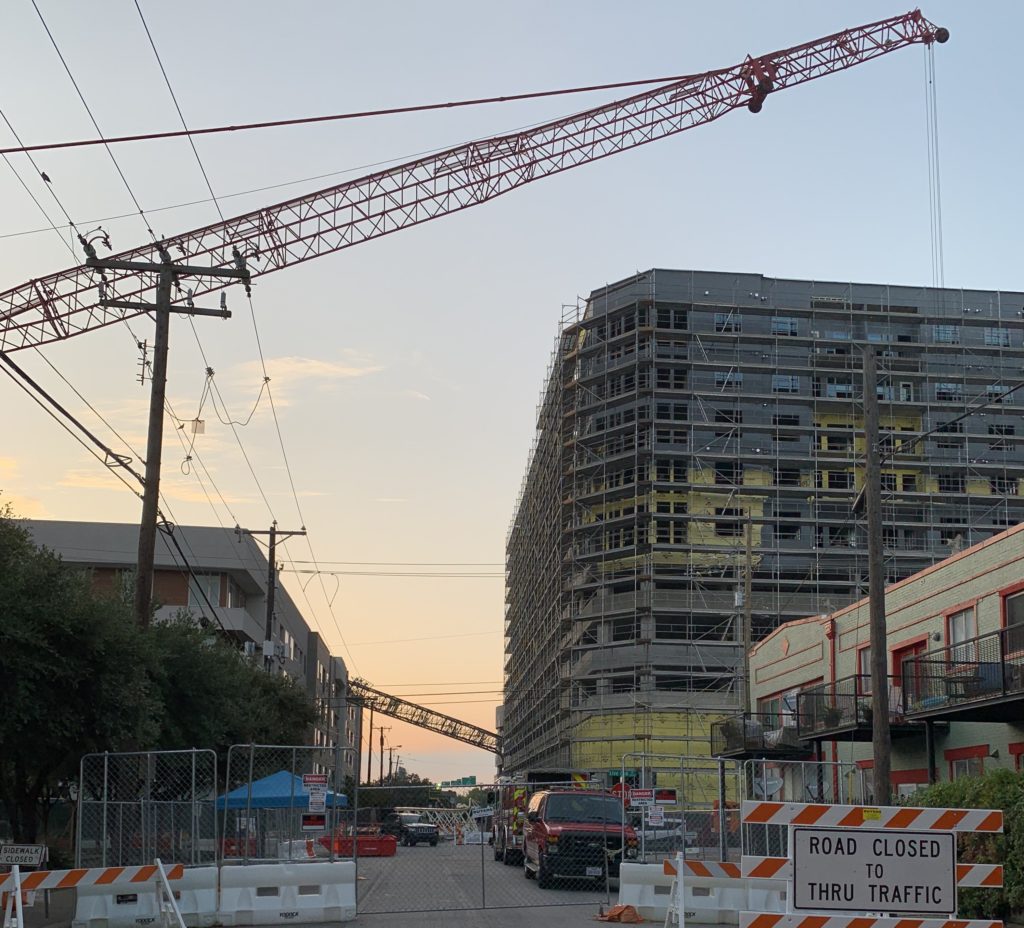
The first trial for victims of a deadly 2019 construction-crane collapse in Dallas began Wednesday, with two defense counsel pointing the finger at one another over who was to blame.
When the crane, more than 200 feet tall, toppled during a severe storm on June 9, 2019, it crashed into an adjacent apartment complex on Live Oak Street near U.S. 75, killing 29-year-old Kiersten Smith, who was in her apartment with her fiancé. Several other people were injured.
The jury trial, before Dallas County Court of Law of Judge Melissa Bellan, is expected to take at least two weeks.
The lead plaintiffs’ lawyer, Jason Itkin of Arnold & Itkin in Houston, is seeking compensatory and exemplary damages “far in excess” of $1 million, according to his lawsuit on behalf of Smith’s mother, Michele Williams, and others. In addition to his brother, Cory Itkin, his co-counsel include Michael P. Lyons of Lyons Simmons in Dallas.
In his opening statement to the jury, Jason Itkin said, “When companies do work where we live, those companies must act safely. If they gamble with someone’s life, if someone is killed, they must take full responsibility.”
Noting that Smith was about to be married, and displaying for the jury a photo of the bride-to-be in her wedding dress, Itkin said, “Instead of planning a wedding, Michele … planned a funeral.”
The defendants in the case include a group of related business entities collectively referred to in the suit as Greystar, one of the world’s leading builders and managers of apartment complexes, including, according to Itkin, 108 such complexes in the Dallas area; and Bigge Crane and Rigging Co., a 106-year-old lessor of cranes and other construction equipment for projects nationwide.
Dana Alden Fox of Los Angeles, representing Greystar, said the accident occurred because the operator of the huge crane, which was owned by Bigge, failed to properly prepare it for adverse weather before clocking out the day before the storm hit. The crane should have been “weathervaned,” Fox said, meaning its long arm, or jib, should have been unlocked from the tower supporting it so it could rotate in heavy winds, rather than being hit by them broadside.
“This was Bigge’s crane,” Fox said. “That crane fell down for one simple reason: It wasn’t weathervaned.” His co-counsel is Christopher C. White, managing partner of the Dallas office of Lewis Brisbois.
Bigge’s lead lawyer, Clayton J. Callen from the Austin office of Bowman and Brooke, said his client’s only involvement in the construction project was to lease the crane to Greystar; erect it on site; perform a one-time inspection after the crane was built; and provide, under contract, a qualified crane operator. Callen pointed to a contract provision saying the operator, Robert Hilty, was a “borrowed servant” to Greystar, which was solely responsible for all aspects of supervising his work.
He called Bigge’s business arrangement with Greystar “essentially an equipment rental agreement.” When the crane was assembled and turned over to Greystar, he said, “it was in perfect working order.” Greystar, he said, was responsible for inspecting the crane thereafter to make sure it stayed that way.
“Is Bigge here because Greystar needs someone else to blame?” Callen asked. “When things go wrong, that tends to happen.”
Hilty has said under oath that he did weathervane the crane before leaving work the evening before the collapse. He is expected to testify next week.
Fox, the Greystar lawyer, flatly disputed the operator’s sworn assertion that he properly readied the crane for the coming inclement weather.
